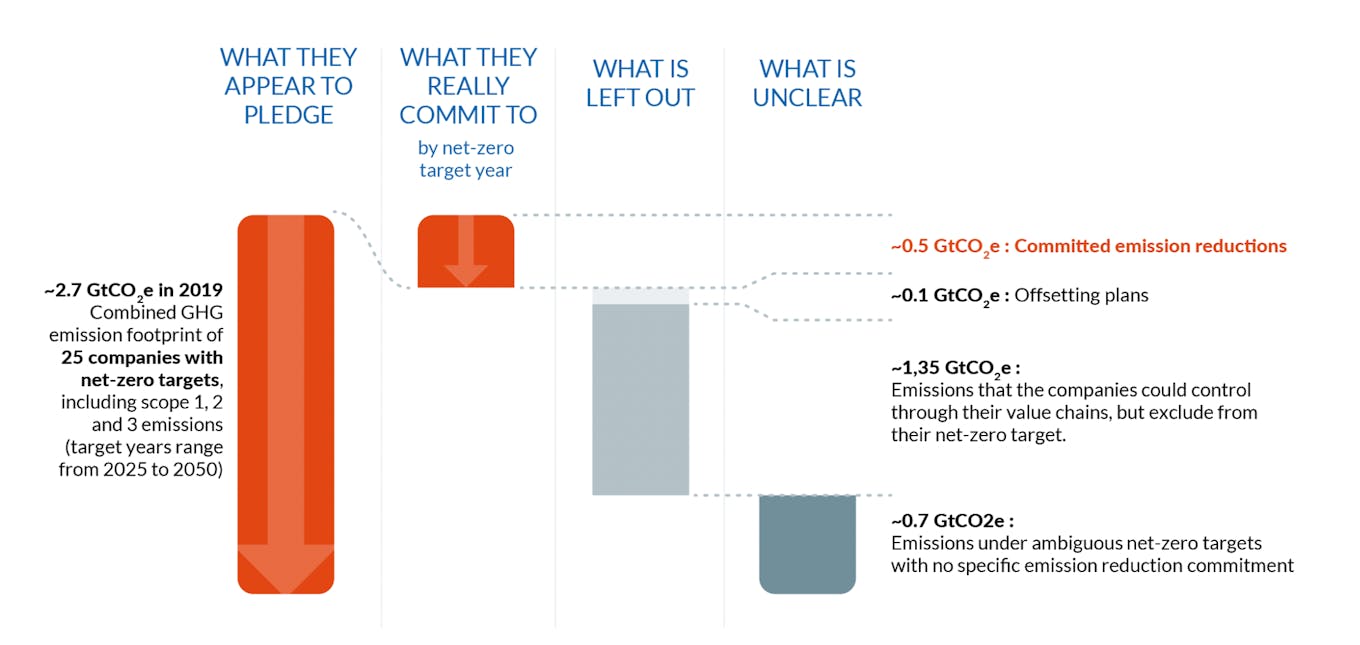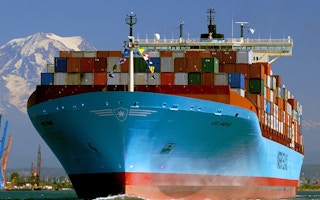Some of the world’s biggest companies will not come close to achieving their claimed net-zero emissions goals, according to new analysis from German think tank NewClimate Institute and Brussels-headquartered non-profit Carbon Market Watch.
To continue reading, subscribe to Eco‑Business.
There's something for everyone. We offer a range of subscription plans.
- Access our stories and receive our Insights Weekly newsletter with the free EB Member plan.
- Unlock unlimited access to our content and archive with EB Circle.
- Publish your content with EB Premium.
The study, titled Corporate Climate Responsibility Monitor (CCRM), notes how household names such as Nestlé, BMW and Novartis will fall short of their own pledges to cut emissions drastically. It had scrutinised the climate promises of 25 firms, most among the world’s largest.
According to the analysis, companies lack the integrity and transparency needed for meaningful decarbonisation. Critical information is hidden, and some firms resort to accounting trickery, said the report.
The companies are also undermined by an overreliance on carbon offsets for a large portion of their projected cuts. Carbon offsetting is the controversial practice of paying for projects that reduce carbon dioxide to compensate for greenhouse gases emitted elsewhere.
Under pressure to reduce their carbon footprint from consumers and investors as the climate crisis intensifies, more than 680 of the world’s largest corporations had made some sort of net-zero pledge by the end of last year. About a quarter of global greenhouse gas emissions come from industry.
The CCRM report scored companies based on whether their net-zero pledges addressed upstream and downstream emissions, their own direct emissions, and the extent to which they compensated for their carbon footprint through carbon offsets.
The study rated only one company — Maersk — as showing “reasonable integrity” in its net-zero commitment. The shipping firm has pledged deep emissions with a target backed up by specific short-term reduction goals.
It found that the 25 companies biggest companies have collectively committed to reducing less than one fifth of emissions needed to reach their net-zero targets. These firms emit about five per cent of global emissions, or 2.7 gigatonnes of carbon dioxide equivalent.
“
Misleading advertisements by companies have real impacts on consumers and policymakers. We’re fooled into believing that these companies are taking sufficient action, when the reality is far from it. Without more regulation, this will continue.
Gilles Dufrasne, policy officer, Carbon Market Watch
Maersk brought forward its net-zero target by a decade in January, introducing more aggressive measures to use greener fuels.
How credible are corporate net-zero targets?
Reasonable integrity: Maersk
Moderate integrity: Vodafone, Sony, Apple
Low integrity: Amazon, Deutsche Telekom, Enel, GlaxoSmithKline, Google, Hitachi, IKEA, Vale, Volkswagen, Walmart
Very low integrity: Accenture, BMW, Carrefour, CVS Health, Deutsche Post DHL, E.ON SE, JBS, Nestlé, Novartis, Saint-Gobain
The pledges of consumer electronics brand Apple, which had committed to be carbon neutral by 2030, rival Sony, which aims to achieve zero emissions by 2050, and telco brand Vodafone, which had declared it will be net-zero by 2040, were assessed to be of “moderate integrity”.
The others were either rated of “low integrity” or “very low integrity”.
“Misleading advertisements by companies have real impacts on consumers and policymakers. We are fooled into believing that these companies are taking sufficient action, when the reality is far from it,” said Gilles Dufrasne from Carbon Market Watch.
“Without more regulation, this will continue. We need governments and regulatory bodies to step up and put an end to this greenwashing trend.”
Weak spots
A major weakness of net-zero claims is that they do not address emissions that occur along the full value chain, including the consequences of using a company’s products. Known as Scope 3 emissions, they can account for 87 per cent of total emissions for the companies assessed in the report.
Just three of the 25 companies studied – telco firms Vodafone and Deutsche Telekom, and Maersk – clearly commit to decarbonise over 90 per cent of their full value chain emissions, said the report.
Thirteen companies that have pledged to reduce their full value chain emissions, have pledged to reduce them by only 40 per cent — well short of the 100 per cent needed to reach their net-zero targets.
The other 12 have no specific emissions reduction commitments for their targets.
Five of the companies would effectively only reduce their emissions by less than 15 per cent, by excluding downstream or upstream emissions in their value chain.
The report found that German electric utility E.ON’s net-zero commitment could be excluding market segments that account for more than 40 per cent of its energy sales, while French retailer Carrefour doesn not count emissions that account for over 80 per cent of Carrefour branded stores.
All but one of the 25 companies is relying on carbon offsets to reach net-zero, noted the study.
Nestlé and Unilever do not offset at the parent company level, but some of their individual consumer-facing brands sell products marketed as carbon-neutral.

Integrity of corporate net-zero pledges: what is missing? Source: Corporate climate responsibility monitor
The report noted credibility problems with all of the carbon neutrality claims from the assessed companies, with factors including limited emissions coverage and the procurement of low-quality carbon credits. However, Maersk and Walmart were credited with investing in nature-based solutions without claiming neutralisation of their own emissions.
One positive trend was the procurement of renewable energy by some companies. Apple was credited for procuring almost all of its energy from renewable sources and its own installations, while Amazon was highlighted for publishing information on its renewable energy portfolio.
Overall, the integrity of renewable electricity procurement remains low, according to the report. Most assessed companies use renewable energy certificates (RECs) to claim their energy use has limited climate impact. The sale of RECs does not necessarily contribute to additional renewables capacity, noted the report.
A number of companies have responded to the report’s findings. E.ON has said that the report is “methodologically incorrect” and that its results are “misleading”; Nestle says they welcome scrutiny of their actions and commitments on climate change, but states that the report lacks understanding of their approach and contains “significant inaccuracies”.








